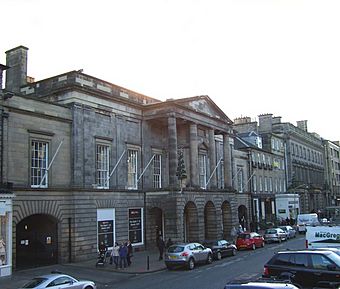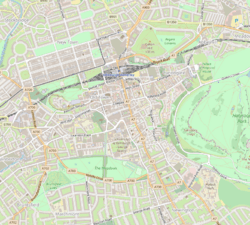Assembly Rooms (Edinburgh) facts for kids
 |
|
| Address | 54 George Street |
|---|---|
| Location | Edinburgh, Scotland |
| Coordinates | 55°57′11″N 3°11′57″W / 55.9530°N 3.1991°W |
| Public transit | St_Andrew_Square, Princes Street, Edinburgh Waverley |
| Owner | Edinburgh City Council |
| Operator | Assembly (Fringe) |
| Type | meeting halls |
| Capacity | Music Hall: 788 Ballroom: 400 |
| Construction | |
| Opened | 11 January 1787 |
| Renovated | 1818, 1907, 2011-2012 |
| Architect | John Henderson |
|
Listed Building – Category A
|
|
| Designated | 13 January 1966 |
| Reference no. | LB27567 |
The Assembly Rooms are important meeting halls in central Edinburgh, Scotland. They were first used as a place for social gatherings. Today, they are also a popular spot for arts events and public celebrations. This includes the famous Edinburgh Festival Fringe and the Hogmanay New Year's Eve party.
The building has four main rooms. These rooms have chairs and tables that can be moved around. They are used all year for private parties and events. These rooms are the Music Hall, Ballroom, Supper Room, and Edinburgh Suite. The whole meeting area was updated in 2012. It now covers about 4,600 square meters. The building is a special "category A listed building." This means it is a very important old building that keeps its original purpose.
Contents
History of the Assembly Rooms
The Assembly Rooms first opened on January 11, 1787. Its very first event was the Caledonian Hunt Ball. People helped pay for the building. It cost more than £6,000, which was a lot of money back then. The city council gave the land for free. This land was in a great spot in the middle of the new part of Edinburgh, called the New Town.
Who Designed the Building?
John Henderson designed the Assembly Rooms. He won a contest in 1781 to be the architect. His first design changed three times before building started in 1783. Sadly, Henderson died in 1786. He did not get to see the building finished.
Royal Visits and Changes
In August 1822, a special party for nobles was held here. This was when King George IV visited Edinburgh. The building got bigger several times in the 1800s. In 1818, a grand entrance called a portico was added. Architect William Burn designed it. Later, in 1843, Burn and his partner David Bryce designed the Music Hall.
More changes happened in 1907. New parts were added to the sides of the building. These were designed by Robert Rowand Anderson and Balfour Paul. A new Supper Room was also added. The kitchen was moved to the new eastern part of the building.
Ownership of the Building
In 1945, the Assembly Rooms were sold to the city of Edinburgh. Later, in 1973, the Edinburgh City Council took over. They have owned the building ever since.
Modern Updates and Refurbishment
In 2011, a big project started to update the Assembly Rooms. This project cost £9.3 million. The goal was to make the spaces modern. But they also wanted to keep the building's original look and feel.
Many groups helped pay for this update. These included the Edinburgh Council, Heritage Lottery Fund, and Historic Scotland. The Scottish Government and Creative Scotland also gave money. LDN Architects managed the design work. Balfour Beatty managed the building work.
What Happens There Now?
The Assembly Rooms in Edinburgh is a place for many different events. It often hosts big meetings, dinners, and shows. Art displays and weddings also take place here.
The venue has two main event areas. These are The Ballroom and the Music Hall. There are also nine other smaller rooms. The inside of the building is very fancy. It has crystal chandeliers, gold decorations, and fancy gold mirrors. But it also has modern technology.
| Room | Max capacity | Area |
|---|---|---|
| Music Hall | 788 | 481m² |
| Ball Room | 400 | 342m² |
The Assembly Rooms and the Edinburgh Festival Fringe
Every year, the Assembly Rooms is a key venue for the Edinburgh Festival Fringe. This is a huge arts festival. The company that first ran events here was called Assembly Festival. They even named themselves after the building!
Assembly Festival grew from this building. They now run events at other places too. One big venue is Assembly Hall. It is a large theatre with 840 seats. It used to be where the Scottish Parliament met.
For a short time, Assembly Festival lost the contract to run the Fringe events at the Assembly Rooms. Another company, Salt 'n' Sauce Promotions, took over. They also run The Stand Comedy Club. But in 2016, Assembly Festival got the contract back.


